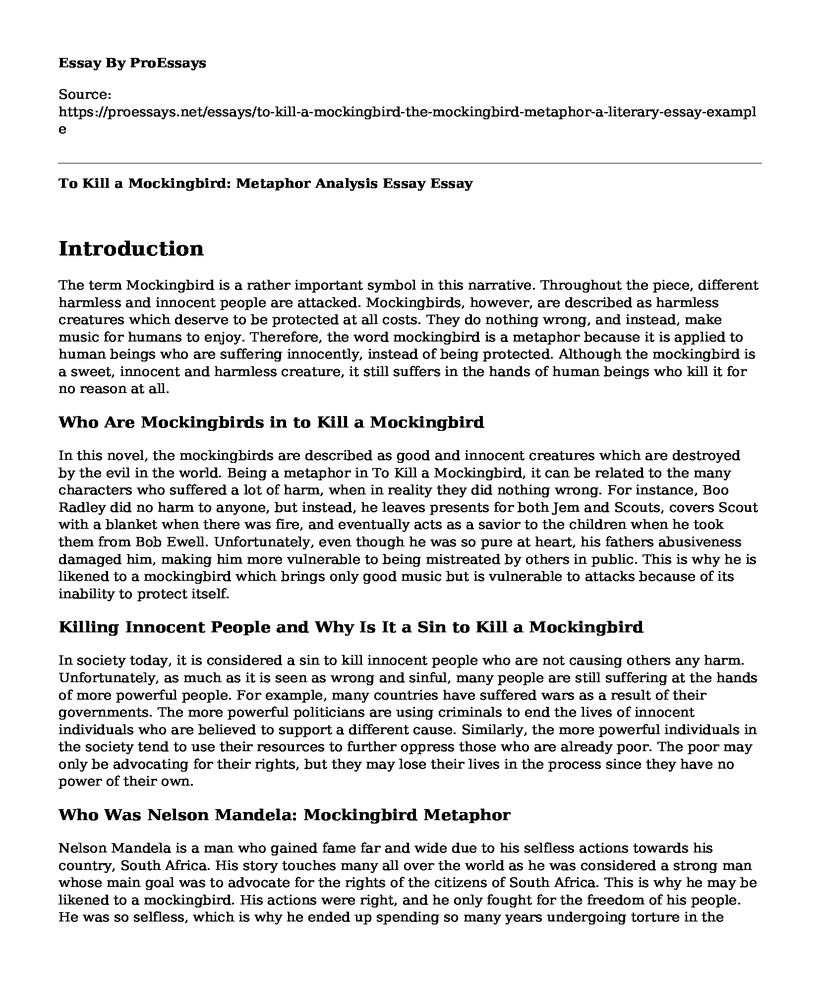Introduction
The term Mockingbird is a rather important symbol in this narrative. Throughout the piece, different harmless and innocent people are attacked. Mockingbirds, however, are described as harmless creatures which deserve to be protected at all costs. They do nothing wrong, and instead, make music for humans to enjoy. Therefore, the word mockingbird is a metaphor because it is applied to human beings who are suffering innocently, instead of being protected. Although the mockingbird is a sweet, innocent and harmless creature, it still suffers in the hands of human beings who kill it for no reason at all.
Who Are Mockingbirds in to Kill a Mockingbird
In this novel, the mockingbirds are described as good and innocent creatures which are destroyed by the evil in the world. Being a metaphor in To Kill a Mockingbird, it can be related to the many characters who suffered a lot of harm, when in reality they did nothing wrong. For instance, Boo Radley did no harm to anyone, but instead, he leaves presents for both Jem and Scouts, covers Scout with a blanket when there was fire, and eventually acts as a savior to the children when he took them from Bob Ewell. Unfortunately, even though he was so pure at heart, his fathers abusiveness damaged him, making him more vulnerable to being mistreated by others in public. This is why he is likened to a mockingbird which brings only good music but is vulnerable to attacks because of its inability to protect itself.
Killing Innocent People and Why Is It a Sin to Kill a Mockingbird
In society today, it is considered a sin to kill innocent people who are not causing others any harm. Unfortunately, as much as it is seen as wrong and sinful, many people are still suffering at the hands of more powerful people. For example, many countries have suffered wars as a result of their governments. The more powerful politicians are using criminals to end the lives of innocent individuals who are believed to support a different cause. Similarly, the more powerful individuals in the society tend to use their resources to further oppress those who are already poor. The poor may only be advocating for their rights, but they may lose their lives in the process since they have no power of their own.
Who Was Nelson Mandela: Mockingbird Metaphor
Nelson Mandela is a man who gained fame far and wide due to his selfless actions towards his country, South Africa. His story touches many all over the world as he was considered a strong man whose main goal was to advocate for the rights of the citizens of South Africa. This is why he may be likened to a mockingbird. His actions were right, and he only fought for the freedom of his people. He was so selfless, which is why he ended up spending so many years undergoing torture in the hands of the White man who colonized the country. His good actions, therefore, may be likened to the song of a mockingbird which is sweet to the ears. Since he was black and had no power, he is also similar to the vulnerable mockingbird. Lastly, his suffering, as a result of lack of power may be likened to how the mockingbird suffers at the hands of senseless human beings who only want to kill it for pleasure.
Conclusion
In conclusion, the same fate of the mockingbird may be likened to that of innocent and harmless human beings who suffer at the hands of the more influential individuals of the society. This metaphor, therefore, is appropriate for the situation as it shows just how much similarity there is between a mockingbird and an innocent, harmless individual who is killed for no good reason.
Cite this page
To Kill a Mockingbird: Metaphor Analysis Essay. (2021, Jun 23). Retrieved from https://proessays.net/essays/to-kill-a-mockingbird-the-mockingbird-metaphor-a-literary-essay-example
If you are the original author of this essay and no longer wish to have it published on the ProEssays website, please click below to request its removal:
- Connotation and Imagery of The Appointment in Samarra, Oedipus the King, Godfather Death
- Essay on Adventures of Huckleberry Finn by Mark Twain
- Crucible as an Allegory Essay
- Rose Pogonials by Robert Frost Essay Example
- Literary Analysis Essay on The E-Myth
- Essay Sample on Role of Women in Greek Mythology
- The Brave and Selfless Warrior: Hector of Troy - Essay Sample







